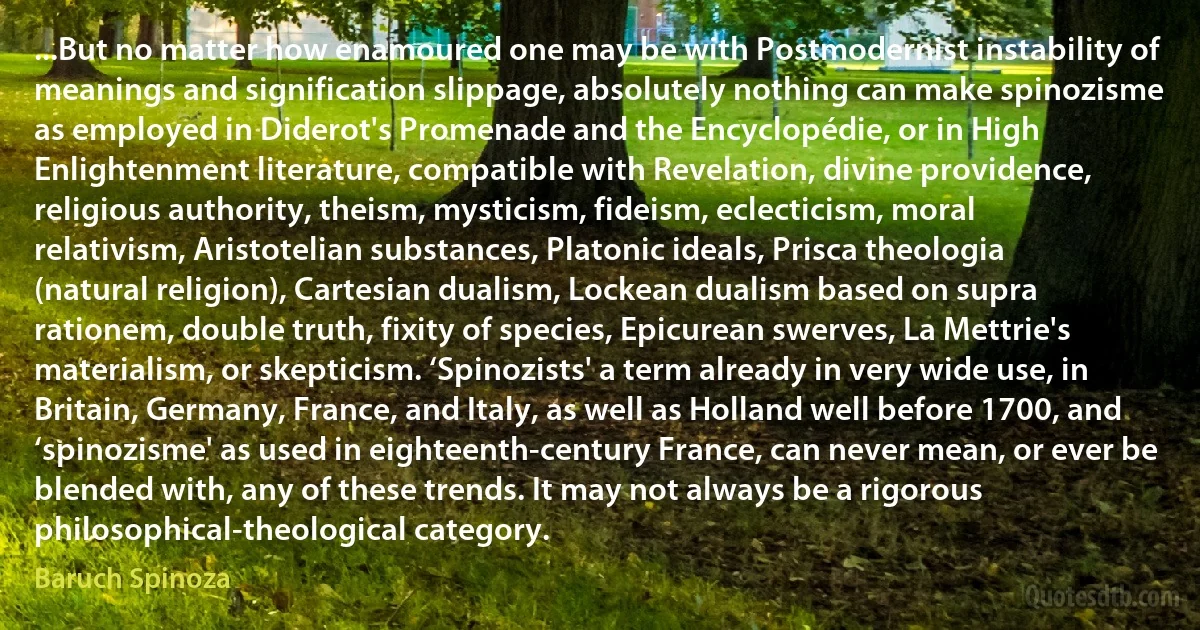
...But no matter how enamoured one may be with Postmodernist instability of meanings and signification slippage, absolutely nothing can make spinozisme as employed in Diderot's Promenade and the Encyclopédie, or in High Enlightenment literature, compatible with Revelation, divine providence, religious authority, theism, mysticism, fideism, eclecticism, moral relativism, Aristotelian substances, Platonic ideals, Prisca theologia (natural religion), Cartesian dualism, Lockean dualism based on supra rationem, double truth, fixity of species, Epicurean swerves, La Mettrie's materialism, or skepticism. ‘Spinozists' a term already in very wide use, in Britain, Germany, France, and Italy, as well as Holland well before 1700, and ‘spinozisme' as used in eighteenth-century France, can never mean, or ever be blended with, any of these trends. It may not always be a rigorous philosophical-theological category.
Baruch SpinozaRelated topics
aristotelian authority cartesian category compatible divine double dualism eclecticism epicurean fixity high holland instability materialism matter mean mysticism natural nothing platonic promenade providence religion signification skepticism theism truth use well wide britain relativismRelated quotes
Nothing can be more untrue than to pretend that the general religious mind of India has not at all grasped the higher spiritual or metaphysical truths of Indian religion. It is a sheer falsehood or a wilful misunderstanding to say that it has lived always in the externals only of rite and creed and shibboleth. On the contrary, the main metaphysical truths of Indian religious philosophy in their broad idea-aspects or in an intensely poetic and dynamic representation have been stamped on the general mind of the people. The ideas of Maya, Lila, divine Immanence are as familiar to the man in the street and the worshipper in the temple as to the philosopher in his seclusion, the monk in his monastery and the saint in his hermitage. The spiritual reality which they reflect, the profound experience to which they point, has permeated the religion, the literature, the art, even the popular religious songs of a whole people.

Sri Aurobindo
Well, it's been the monopolizing of great wealth, which tends to happen in basically unjust societies and undemocratic societies. We have plenty of would-be democrats, would-be liberals, and would-be progressives. But how do you organize? The Democratic Party is a machine to get votes for its people, none of who should probably be elected to the high offices of state. That's all. The Republican Party is fundamentally crooked and might well be outlawed one of these days. Le Pen, you know, in France, who is an out-and-out fascist, the French have managed in some clever way to contain him. I mean, he's always running for president; his votes never seem to show up. I don't know how they do it, but we've got to do that with the Republican base, the religious right. We don't want them running the country. Nobody does. Certainly not the founding fathers. And I think we have to ride herd on them and make sure they do not seize the state.

Gore Vidal
At the core of punctuated equilibria lies an empirical observation: once evolved, species tend to remain remarkably stable, recognizable entities for millions of years. The observation is by no means new, nearly every paleontologist who reviewed Darwin's Origin of Species pointed to his evasion of this salient feature of the fossil record. But stasis was conveniently dropped as a feature of life's history to he reckoned with in evolutionary biology. And stasis had continued to be ignored until Gould and I showed that such stability is a real aspect of life's history which must be confronted-and that, in fact, it posed no fundamental threat to the basic notion of evolution itself. For that was Darwin's problem: to establish the plausibility of the very idea of evolution, Darwin felt that he had to undermine the older (and ultimately biblically based) doctrine of species fixity. Stasis, to Darwin, was an ugly inconvenience.

Niles Eldredge
That abject, squalid, shameless avowal...It is a very disquieting and disgusting symptom...My mind turns across the narrow waters of Channel and the North Sea, where great nations stand determined to defend their national glories or national existence with their lives. I think of Germany, with its splendid clear-eyed youths marching forward on all the roads of the Reich singing their ancient songs, demanding to be conscripted into an army; eagerly seeking the most terrible weapons of war; burning to suffer and die for their fatherland. I think of Italy, with her ardent Fascisti, her renowned Chief, and stern sense of national duty. I think of France, anxious, peace-loving, pacifist to the core, but armed to the teeth and determined to survive as a great nation in the world. One can almost feel the curl of contempt upon the lips of the manhood of all these people when they read this message sent out by Oxford University in the name of young England.

Winston Churchill
In 1946, a Macy Foundation interdisciplinary conference was organized to use the model provided by "feedback systems," honorifically referred to in earlier conferences as "teleological mechanisms," and later as "cybernetics," with the expectation that this model would provide a group of sciences with useful mathematical tools and, simultaneously, would serve as a form of cross-disciplinary communication. Out of the deliberations of this group came a whole series of fruitful developments of a very high order. Kurt Lewin (who died in 1947) took away from the first meeting the term "feedback". He suggested ways in which group processes, which he and his students were studying in a highly disciplined, rigorous way, could be improved by a "feedback process," as when, for example, a group was periodically given a report on the success or failure of its particular operations.

Margaret Mead
